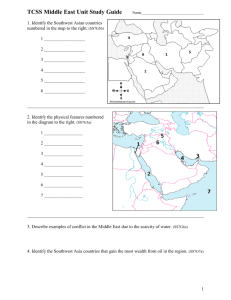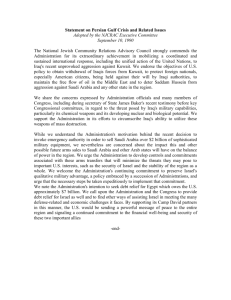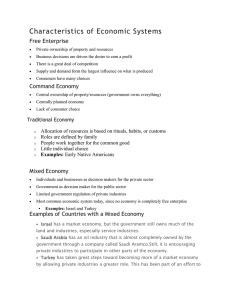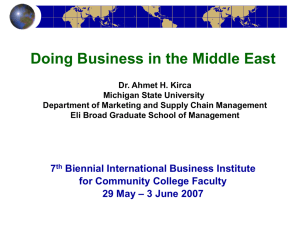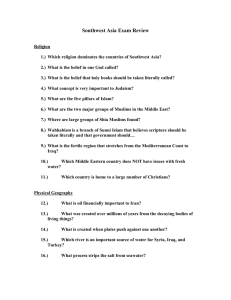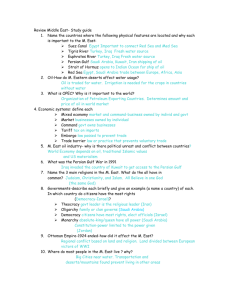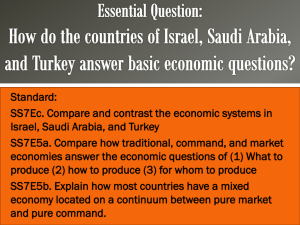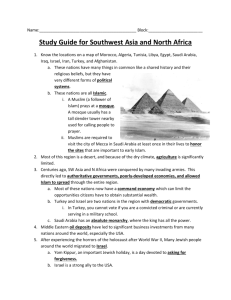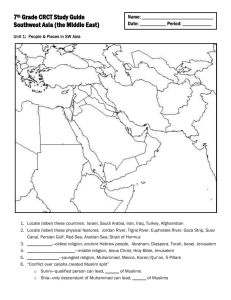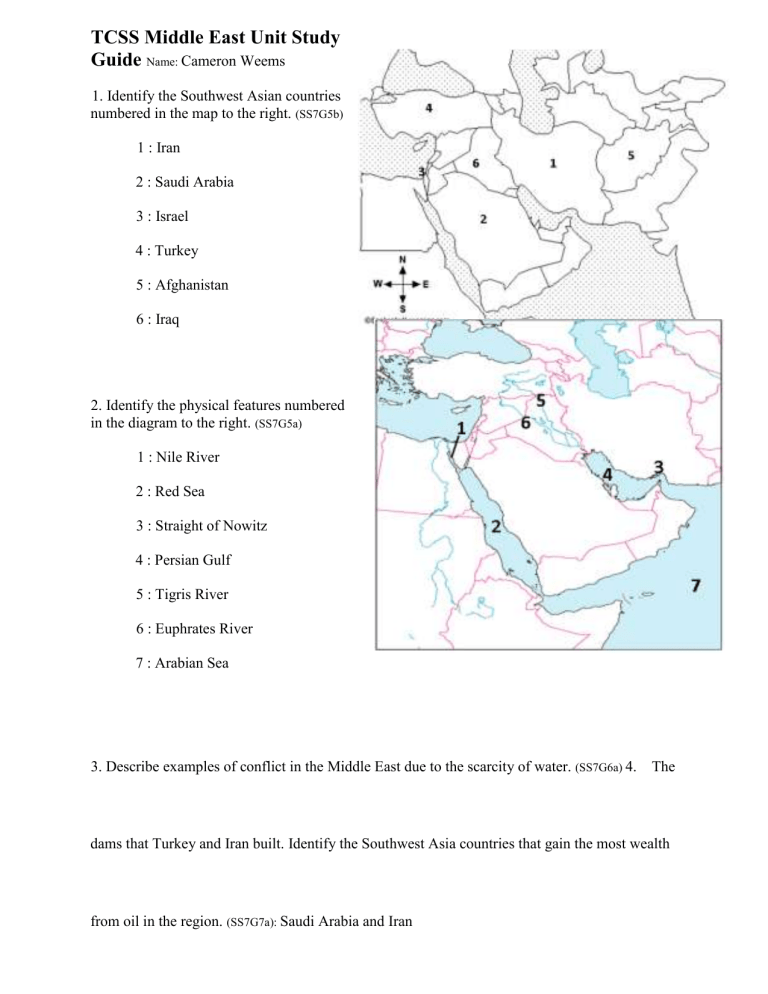
TCSS Middle East Unit Study Guide Name: Cameron Weems 1. Identify the Southwest Asian countries numbered in the map to the right. (SS7G5b) 1 : Iran 2 : Saudi Arabia 3 : Israel 4 : Turkey 5 : Afghanistan 6 : Iraq 2. Identify the physical features numbered in the diagram to the right. (SS7G5a) 1 : Nile River 2 : Red Sea 3 : Straight of Nowitz 4 : Persian Gulf 5 : Tigris River 6 : Euphrates River 7 : Arabian Sea 3. Describe examples of conflict in the Middle East due to the scarcity of water. (SS7G6a) 4. The dams that Turkey and Iran built. Identify the Southwest Asia countries that gain the most wealth from oil in the region. (SS7G7a): Saudi Arabia and Iran 1 TCSS Middle East Unit Study Guide Name: Cameron Weems 5. Identify the nations and physical features numbered in the diagram to the right. (SS7G5a) 1 : Gaza Strip 2 : Negev Desert 3 : Jordan River 6. Identify the three major water problems in the Middle East. (SS7G6a) Desertification is increasing, not lots of agricultural land, and there isn’t distribution with water in the Middle East. 7. Describe the effect natural resources, such as oil, should have on an economy in a country. (SS7G7a) I think the prices on the goods would go up. 8. Why do most people of Southwest Asia live close to water supplies? (SS7G7b)They need water for agriculture. They need the water because Asia doesn't have that kind climate 9.Explain the difference between an ethnic group and a religious group. An ethni group shares a belief system in a god or gods share cultural ideas and beliefs. (SS7G8a) 10. What do the ethnic groups of Arabs, Persians, and Kurds have in common? They all share ancestry.(SS7G8b) 11. Where do almost all Middle Eastern Jews live? Most jews living Israel because that was the country that was made for them. Why? (SS7G8c) 12. Describe the difference between Sunni Muslims and Shia Muslims. (SS7G8d) They are different because sunni and shia pray differently and they also don’t have the same beliefs. 13. Describe how literacy rate and the investment in human and physical capital impacts standard of living. (SS7G8e) 14. Describe how power is distributed in a unitary form of government. (SS7CG4a) 15. Governments distribute power in a variety of ways. Identify which method of distributing power is least likely to be found in countries in the Middle East. Explain Why. (SS7CG4a) 16. Describe how power is distributed in a confederation. (SS7CG4a) . 2 TCSS Middle East Unit Study Guide Name_________________________________ 17. Describe how citizens participate in an autocracy. (SS7CG4b) 18. Which Southwest Asian country’s leadership and personal freedoms of its citizens are most closely related to its primary religion? (SS7CG5a) 19. Describe how citizens participate in an oligarchy. (SS7CG4b) 20. Who holds the most power in Israel’s government? (SS7CG5a) 21. Describe a traditional economy. (SS7E5a) 22. Describe how the government of Saudi Arabia is different from the governments of Israel and Iran. (SS7CG5a) 23. Describe the form of leadership and the role of citizens in Israel. (SS7CG5a) 24. Which resource do most Middle East countries specialize in that encourages trade with other countries? (SS7E6a, E7c) 25. Describe an embargo. (SS7E6b) 26. How is Turkey’s economy similar to Saudi Arabia’s economy? (SS7E5c) 27. Describe the economy of Saudi Arabia. (SS7E5c) 28. Describe economic specialization and its effect on imports and exports. (SS7E6a) 29. Describe the main purpose of OPEC. (SS7E6c) 30. Explain what is meant by currency exchange. (SS7E6d) 3 TCSS Middle East Unit Study Guide Name_________________________________ 31. After World War I, explain how and why European countries established new borders in the Middle East. (SS7H2a) 32. What led to the fall of the Ottoman Empire? (SS7H2a) Siding with Germany led to the downfall of the Ottoman empire. 33. Explain the circumstances that led to the establishment of the state of Israel. Israel was created because they felt bad for the Jews after the Holocaust.(SS7H2b) 34. Explain the Zionist movement. (SS7H2b) The Zinonist movement was a movement for the Jews because of the Holocaust. 35. Identify the land issues that continually cause conflict in the Middle East. (SS7H2c) 36. Describe investment in human capital. (SS7E7a) 37. Describe why Iran might have a low standard of living. (SS7E7a,b) 38. Define and describe Anti-Semitism in the early 1900’s in Europe. (SS7H2b) 39. Explain how religion impacts the Middle East. (SS7H2c) 40. Why does the state of Israel create so much conflict in the Middle East? (SS7H2c) 41. Why did the United Nations attempt to block Iraq from taking over Kuwait in 1990? (SS7H2d) 42. Why did the United States invade Afghanistan in 2001? (SS7H2d) 43. Why did the United States go to war against Iraq in 2003? (SS7H2d) 4
